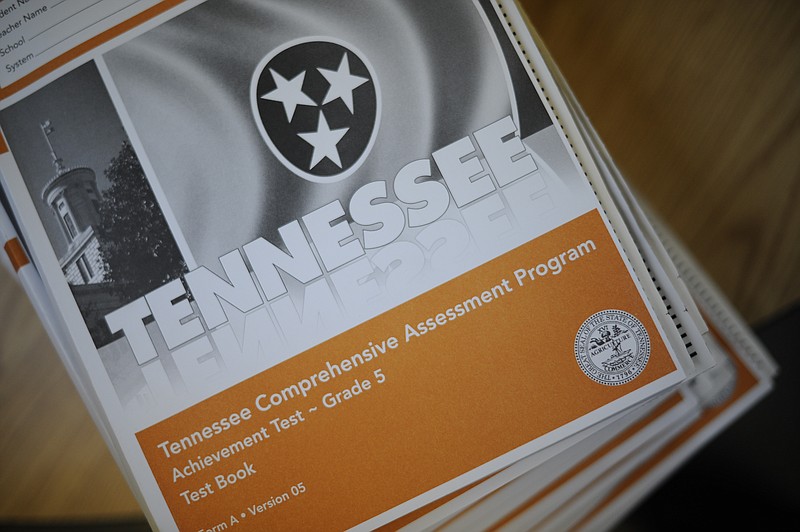Hamilton County school scores
Grades 3-5English language arts — 34.3 % masteredMath — 39.1 % masteredScience — 50.6 % masteredGrades 6-8English — 31.9 % masteredMath — 34.2 % masteredScience — 56.4 % masteredGrades 9-12English — 25.6 % masteredMath — 17.4 % masteredScience — 38 % masteredHistory — 18.1 % masteredSource: Hamilton County Department of Education
For a couple of years now, we've been lamenting the fact that 60 percent of Hamilton County's third-graders can't read at grade level.
It turns out that things are much, much worse.
In reality, only 34 percent of our third-graders are on track or have mastered English language arts, according to Hamilton County's most recently released TNReady test results. (Yes, English language arts, in this test at least, is the education term for reading in early elementary grades.)
As hard as it is to comprehend that barely a third of our youngest school children can read well enough to learn in the third grade, it's even harder to fathom that this is a 2.3 percent improvement over our TNReady scores from 2017, the year before.
But that's not all. Only 35.7 percent of Tennessee's third-graders can read at grade level, according to the 2018 scores. This is not a failure that is easy to overcome. We've all heard the saying: We learn to read, and read to learn.
Our educators on Thursday tried to put a smiley face on the numbers, telling us that here in Hamilton County, we're closing the gap between our scores and the state's scores.
Really? We're touting a gain against a ridiculously low, low bar?
Let's be clear. This is not a mark against our new superintendent, Dr. Bryan Johnson. Nor is it a mark against the school board's efforts to help Johnson make some leadership, policy and school changes we hope over time will lead us out of the mess.
Johnson has been here only a year, and we support his efforts to incorporate the many good ideas of the Chamber of Commerce-organized Chattanooga 2.0, the grassroots organizing group UnifiEd and the Tennessee Department of Education.
With their input, Johnson is establishing career-ready institutes to help make our high school graduates leave school job ready (only about 40 percent are now), as well as the Partnership Network, which is designed to give a boost to our five lowest-performing schools rather than give them up to a state takeover.
We realize none of those changes were up and running last year in time for these tests. But we also realize that none or all of them is likely to make a significant difference in next year's tests, or even the following year's scores. (Make no mistake, however: We'd be happy to take a miracle.)
Likewise, we don't blame parents, or state testing, or teachers.
We're in this sinking boat because we don't value early childhood education and best-teacher recruitment and retention enough to fund those very vital - those tried-and-true - educational pathways to giving children the best foundation for their futures.
Hamilton County needs to bite the bullet and fund education well enough to pay for universal pre-K education and universal programs like Chattanooga's Baby University. We also must pay teachers well enough to attract and keep the best ones, not the least-effective ones.
In recent years, at least, we have had far too many "least effective" teachers. A 2016 analysis found that Hamilton County had almost twice the number of "least effective" classroom teachers - at 29 percent - as the state's other major school districts and the state average.
And where do our nearly one-third of least-effective teachers work? Largely in the classrooms of impoverished and high-minority schools. And - you probably guessed this - those students and their schools, by and large, show the least academic gain from year to year, consistently dragging down not only our school system's overall test scores but also our community's earnings and jobs growth potential.
While paying teachers better, we also need to help them improve - even over their protests. For years, we've heard the Tennessee Education Association complain that it's "unfair" to tie teachers' evaluations to their students' standardized test scores. After teacher unions raised a ruckus, state efforts to tie a teacher's license renewals to those gains or non-gains as shown by year-to-year academic growth assessments were dropped.
That kid-glove handling of teachers hasn't helped our children - especially here in Hamilton County.
With good school leadership, a principal or superintendent can track, for example, that Ms. Smith's math pupils didn't make gains in math because they haven't mastered fractions, but Ms. Jones' math students did. The principal can put the two teachers together to talk about and demonstrate what method Ms. Jones used to teach fractions. And you can bet that if Ms. Smith's raise or a portion of it is tied to whether her students can learn fractions, she'll be searching high and low for the best way to teach fractions.
There is no one fix - any more than there is one single failure.
But one thing is certain. Our children are our future, and they cannot grow themselves - let alone our community - if they cannot learn to read and read to learn.
